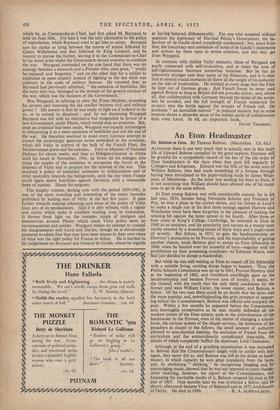Vichy Pro-Consul .
" IF the British come with four divisions, I shall fire on them ; if with twenty, I shall welcome them." This epigram of General Weygand on his policy as Delegate-General of Vichy in North Africa in 1940 became famous, and he now admits it to be authentic. To many English people this has always seemed a slyly: ambiguous policy. But in this volume of his Memoirs the General gives a detailed and lucid explanation of the principles which prompted his 'resolve to adhere strictly and literally to the terms of the armistice which he, as Commander-in-Chief, had first asked M. Reynaud to seek on June 10th. For him it was the only alternative to the policy of capitulation, which Reynaud tried to get him to adopt. Reynaud saw his choice as lying between the course of action followed by Queen Wilhelmina and that followed by King Leopold, and he wanted to pursue the former, leaving it to the Commander-in-Chief to lay down arms whilst the Government moved overseas to continue the war. Weygand contended on the one hand that there was no analogy between a monarch and a Premier who, once gone, " would be replaced and forgotten," and on the other that for a soldier to capitulate in open country instead of fighting to the last ditch was contrary to the code of military honour. He retorted that, as Reynaud had previously admitted, " the cessation of hostilities, like the entry into war, belonged to the domain of the general conduct of the war, which was the business of the Government."
Was Weygand, in refusing to obey the Prime Minister, exceeding his powers and renewing the old conflict between civil and military power ? His answer is that he was ready to fight on if ordered to do so, or to submit to dismissal : and by not dismissing Weygand Reynaud was left with no alternative but resignation in favour of a new Government, under Main, which would seek an armistice. But, once an armistice had been made, Weygand was equally intransigent in interpreting it as a mere cessation of hostilities and not the end of the war. He therefore resolved to resist every German attempt to exceed the surprisingly generous terms embodied in the armistice, which left Vichy in control of the bulk of the French Fleet, the Mediterranean ports and the colonies. First as Minister of National Defence for eleven weeks, and then as Delegate-General in Africa until his recall in November, 1941, he threw all his energies into using the respite of the armistice to reorganise the forces at the disposal of Vichy and to prepare for the renewal of the war. This involved a policy of sustained resistance to collaboration and of strict neutrality towards the belligerents, until the day when France could again renew hostilities against Germany with a reasonable hope of success. Hence his epigram.
This lengthy volume, dealing only with the period 1939-1941, is one of the most revealing and interesting of the many memoirs published by leading men of Vichy in the last few years. It goes further towards making coherence and sense of the policy of Vichy than any of its predecessors. And it is ably written, with a vigour and clarity which make it excellent reading, even in translation. It throws fresh light on the complex tangle of intrigues and manoeuvres around Petain which made Vichy policy seem so inconsequential and sinister. Weygand makes no attempt to conceal his disagreements with Laval and Darlan, though he is chivalrously prepared to admit that they may have been sincere in their own views of what was the right policy for France in defeat. He is harsher in his judgements on Reynaud and General de Gaulle, whom he regards
as having behaved dishonourably. For one who accepted without question the legitimacy of Marshal Petain's Government, the be- haviour of de Gaulle stood completely condemned ; but, apart from that, the inaccuracy and unwisdom of some of de Gaulle's statements and actions lay them open to severe criticism, and this they get from Weygand.
In common with similar Vichy memoirs, these of Weygand are partly concerned with self-vindication, and at times the tone of self-righteousness becomes somewhat tiresome. But he has an inherently stronger case than many of the Petainists, and it is clear that at several crucial moments he threw all the weight of his authority on the side of moderation. He insisted at every stage that the Fleet be kept out of German grasp ; that French forces be never used against Britain so long as Britain did not provoke action ; and, above all, that collaboration with Germany beyond the terms of the armis. tice be avoided, and the full strength of France conserved for re-entry into the battle against the invader of French soil. He professes " an incredible naïveté " in political matters, but in some respects shows a shrewder sense of the subtler perils of collaboration than even Laval. In all, an important book. •
DAVID THOMSON.



























































 Previous page
Previous page